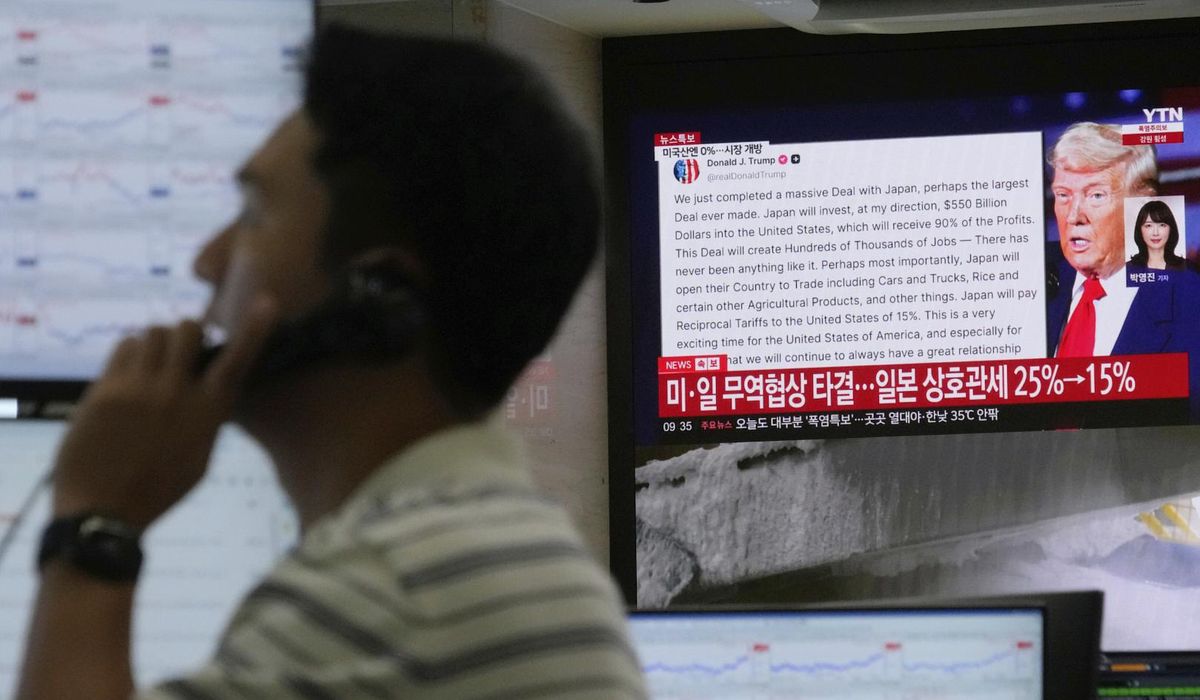


South Korea is reportedly considering a proposal to invest $100 billion in the U.S. as part of trade talks with President Trump.
Seoul is mulling the offer as it tries to decrease a 25% tariff that Mr. Trump threatened to impose on South Korean products, effective Aug. 1.
The investment package would include commitments from conglomerates Samsung Group, SK Group, Hyundai Motor Group and LG Group, according to Yonhap News Agency, which cited industry sources.
South Korea faces pressure to land a deal before the August deadline, especially since Japan managed to knock down its tariff rate from 25% to 15% by promising to open its markets to U.S. goods and invest $550 billion in U.S. projects.
U.S.-South Korea talks hit a minor snag on Thursday, when “two plus two” negotiations between the sides had to be postponed due to Treasury Secretary Scott Bessent’s schedule.
While Japan’s investment is far larger than South Korea’s reported proposal, the amounts would be commensurate with the sizes of each country’s economies.
SEE ALSO: ‘Money flowing in’: White House seizes momentum on trade after big Japan deal
Mr. Trump is setting tariff rates and striking deals ahead of his Aug. 1 deadline. In many cases, he is setting tariff rates on imports from select nations instead of working out complex deals.
Mr. Trump late Wednesday suggested the floor for those tariffs would be 15% — up from the current blanket rate of 10% — while some countries could face tariffs as high as 50% on their products.
He has negotiated arrangements with the U.K., Vietnam, Indonesia, the Philippines and Japan that knock down tariff rates in exchange for investments or greater market access in those countries for U.S. goods.
Tariffs are a tax or duty paid by importers on goods they bring in from foreign markets.
Mr. Trump says tariffs are a great way to force companies to return to America or keep their operations in the U.S., employ American workers and create revenue to fund domestic programs.
Foreign countries don’t pay the tariffs directly to the U.S. Treasury. In many cases, U.S. companies will pay the levies, and they might pass on at least some of the cost to consumers through higher prices.
So far, there hasn’t been major systemic inflation from the tariffs, though some companies said they had to pass on price hikes.
Besides South Korea, Mr. Trump is trying to manage high-stakes negotiations with the European Union, a major trading bloc, and he is sending a delegation to Stockholm, Sweden, next week to continue talks with China.
The Chinese ambassador to the U.S., Xie Feng, said Vice Premier He Lifeng will be in Sweden from July 27 to July 30 to lead trade talks for the Chinese side.
“The two sides will leverage the role of the China-US economic and trade consultation mechanism, and continue to engage in consultations on economic and trade issues of mutual concern based on the principle of mutual respect, peaceful coexistence and win-win cooperation,” Mr. Feng said on X.
• Tom Howell Jr. can be reached at thowell@washingtontimes.com.
